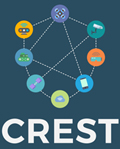©2026 MKLab.
Some Rights Reserved.
Built with Hugo & hyde-hyde.
Logo made by Freepik from www.flaticon.com
CREST aims to equip LEAs with an advanced prediction, prevention, operation, and investigation platform by leveraging the IoT ecosystem, autonomous systems, and targeted technologies and building upon the concept of multidimensional integration and correlation of heterogeneous multimodal data streams (ranging from online content to IoT-enabled sensors) for a) threat detection and assessment, b) dynamic mission planning and adaptive navigation for improved surveillance based on autonomous systems, c) distributed command and control of law enforcement missions, d) sharing of information and exchange of digital evidence based on blockchain, and e) delivery of pertinent information to different stakeholders in an interactive manner tailored to their needs.
CREST will also provide chain-of-custody, and path-to-court for digital evidence. Human factors and societal aspects will also be comprehensively addressed, while information packages for educating the wider public on identifying threats and protecting themselves will be prepared and distributed. The platform development will adopt ethics and privacy by-design principles and will be customisable to the legislation of each member state. CREST will be validated in field tests and demonstrations in three operational uses cases: 1) protection of public figures in motorcades and public spaces, 2) counter terrorism security in crowded areas, and 3) Cross-border fight against organised crime (e.g. firearms trafficking). Extensive training of LEAs' personnel, hands-on experience, joint exercises, and training material, will boost the uptake of CREST tools and technologies. With a Consortium of 8 LEAs from 8 European countries, 7 research/academic institutions, 1 civil organisation, and 7 industry partners, CREST delivers a strong representation of the challenges, the requirements and the tools to meet its objectives.

H2020 SU-FCT02-2018-2019-2020